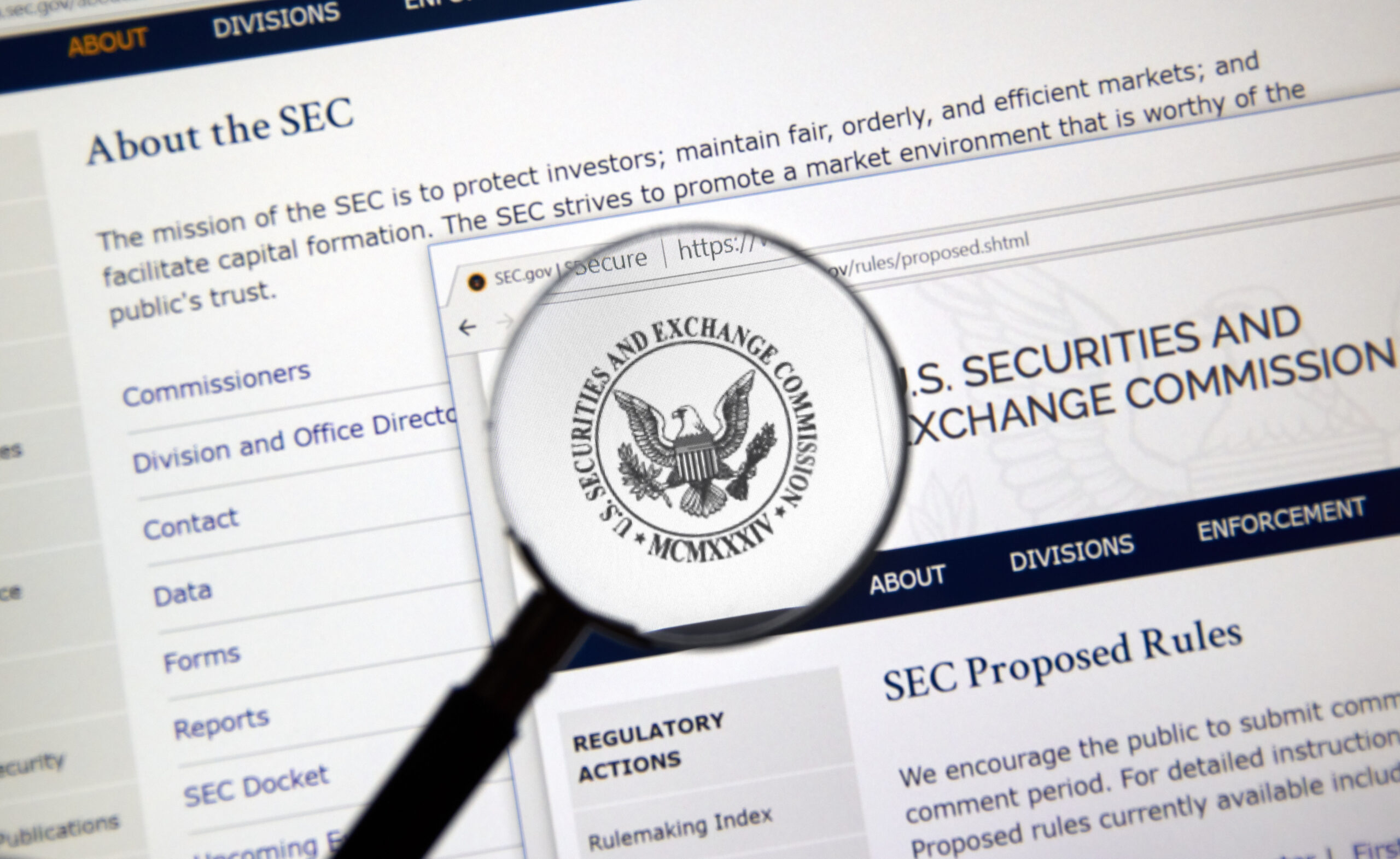Navigating the complex world of federal securities fraud can be daunting, especially when facing potential criminal charges. Understanding the roles of the Securities and Exchange Commission (SEC) and the Department of Justice (DOJ), as well as the key provisions and violations of federal securities laws, is crucial in protecting one’s rights and interests. One common question is, “can the SEC bring criminal charges?” This blog post provides a comprehensive overview of the topic, addressing this concern and shedding light on the legal process surrounding securities fraud.
Key Takeaways
- The SEC is responsible for enforcing federal securities laws and protecting investors from fraud.
- Securities fraud violations may lead to criminal prosecution with potential penalties including fines, restitution, and imprisonment.
- Securing legal representation is essential when facing charges of securities fraud.
The Role of the Securities and Exchange Commission (SEC)

The SEC is tasked with enforcing federal securities laws, regulating the securities industry, and safeguarding investors from federal securities fraud. As the watchdog of the financial markets, the SEC has the legal power to demand the production of documents, prohibit market activity, and seek civil penalties, which may be determined by an administrative law judge.
The SEC ensures compliance with securities law and promotes transparency in the industry through its oversight of:
- Securities exchanges
- Brokers and dealers
- Investment advisors
- Mutual funds
The significance of the SEC cannot be overstated; they are integral to maintaining the trustworthiness of the securities markets and may bring cases to federal court when necessary.
SEC Investigations
The SEC conducts investigations to determine if securities laws have been violated. These investigations typically consist of:
- An informal inquiry
- Interviewing pertinent persons
- Data inspection related to commodity or securities transactions
- Formal investigation
- Fact-finding
- Decision-making
The duration of an SEC investigation can vary depending on the complexity of the case, such as cases involving false or fraudulent pretenses. The SEC’s thorough examination of these cases is crucial for protecting investors and maintaining the integrity of the financial markets.
Civil Penalties and Administrative Proceedings
When the SEC finds evidence of violations, it can impose civil penalties, issue cease-and-desist orders, and initiate administrative proceedings against individuals or companies. Civil penalties consist of fines imposed by the SEC, while criminal penalties may include incarceration and fines imposed by the DOJ.
The civil penalties for securities fraud vary depending on the violation, with different tiers of penalties based on the severity of the violation.
Administrative proceedings, on the other hand, are initiated by the SEC against individuals or companies for violations of federal securities laws and may result in cease-and-desist orders, disgorgement of profits, and other remedial measures.
Criminal Prosecution and the Department of Justice (DOJ)

The DOJ is responsible for prosecuting criminal cases involving securities fraud. In more severe cases, the SEC may forward its findings to the DOJ for criminal prosecution and even “lend” its Senior Attorneys to the DOJ to aid in the prosecution of criminal charges in securities fraud cases.
The DOJ’s Fraud Section is responsible for examining and prosecuting sophisticated economic criminal acts, including securities fraud, and focuses on intricate securities, commodities, cryptocurrency, and other financial fraud cases.
The DOJ, in its role of preserving the integrity of commercial and financial markets and protecting investors from fraud and misconduct, is instrumental in the investigation and prosecution of securities fraud.
Federal Securities Laws: Key Provisions and Violations

The primary statutes governing the issuance, sale, and trading of securities are the Securities Act of 1933 and the Securities Exchange Act of 1934. These laws form the foundation of federal securities regulations and have a significant impact on the financial markets.
Common violations of federal securities regulations include insider trading, pump and dump schemes, and accounting fraud. Allegations of securities fraud can be attributed to individuals, corporations, and securities brokers.
Penalties for conspiring to commit securities fraud are equivalent to those of actual securities fraud, which may include:
- Incarceration
- Fines
- Forfeiture of unlawfully obtained gains
- Reparation to aggrieved parties.
The Process of Bringing Criminal Charges for Securities Fraud
To bring criminal charges for securities fraud, the SEC must first investigate the alleged violations and gather evidence. The investigation will involve interviewing relevant persons, inspecting data related to the commodity or securities transaction in question, and determining if criminal charges are appropriate.
If the SEC believes criminal charges are necessary, it can refer the case to the Department of Justice for prosecution. Potential penalties associated with convictions for securities fraud may include fines, restitution, and imprisonment. When cases are referred to the DOJ, the SEC is ensuring that those guilty of committing securities fraud are facing the full force of the law.
Potential Penalties for Securities Fraud Convictions
Penalties for securities fraud convictions can be severe, including:
- Up to 20 years in prison
- A fine of up to $5 million
- Disgorgement of profits
- Confiscation of property obtained from the proceeds of the offense
The gravity of the penalties is contingent upon the character of the violation and the amount of financial detriment incurred.
The federal sentence for securities fraud has steadily increased over the years. According to statistics from 2018, the average sentence imposed is between 20-24 months in prison. These penalties serve as a strong deterrent and help maintain the integrity of the financial markets.
Defending Against Securities Fraud Charges
Defending against securities fraud charges may involve:
- Challenging the evidence
- Asserting good faith belief in the truth of statements made
- Arguing that the defendant had no knowledge of the SEC rules being violated.
The defendant is not guilty of the federal crime of securities fraud if he honestly and in good faith believed the false statements or promises made were true. Such belief must be genuinely held by the defendant..
The No Knowledge Defense is another option, where the defendant must demonstrate by a greater weight of the evidence that they were unaware of the presence of the SEC rule or regulation that prohibited the illegal conduct.
The Importance of Legal Representation

When confronting charges of securities fraud, securing legal representation is crucial. This is due to the federal government’s approach of deploying extensive resources, and possibly amassing a significant amount of evidence even before the defendant becomes aware of the investigation. Hiring an experienced defense attorney can safeguard your rights by guaranteeing that all evidence is collected and presented correctly, and by furnishing legal direction and advice throughout the process.
Additionally, they may strive for the most desirable outcome in your case by negotiating with prosecutors and advocating for a favorable resolution.
Summary
From understanding the roles of the SEC and DOJ to navigating the complex world of federal securities laws, it’s clear that facing securities fraud charges can be a daunting experience. Armed with the knowledge provided in this blog post, individuals and corporations can better protect their rights and interests in the face of potential criminal charges. Remember, hiring an experienced defense attorney is crucial in achieving the best possible outcome in your case, as they can navigate the legal process and advocate for your interests at every turn.
Frequently Asked Questions
Does the SEC have criminal enforcement power?
Yes, the SEC has criminal enforcement power through its referrals to the Department of Justice (DOJ). While it does not have direct criminal prosecution powers, the SEC can recommend that federal or state prosecutors bring criminal charges against alleged violators. This power is an important tool for the SEC to use in order to protect investors and maintain the integrity of the markets. The SEC can also bring civil enforcement actions against those who violate securities laws
How serious is an SEC investigation?
An SEC investigation is serious and can result in significant legal action if not addressed properly. The SEC may take enforcement action, including filing lawsuits and seeking court orders, if you do not respond to the investigation.
What is the role of the Securities and Exchange Commission (SEC) in securities fraud cases?
The Securities and Exchange Commission (SEC) plays an important role in protecting investors from fraud by enforcing federal securities laws, regulating the securities industry and referring cases to the Department of Justice for criminal prosecution.
What are the key provisions and common violations of federal securities laws?
The key provisions of federal securities laws include the Securities Act of 1933 and the Securities Exchange Act of 1934, with common violations such as insider trading, pump and dump schemes, and accounting fraud.
What is the process of bringing criminal charges for securities fraud?
The SEC investigates potential securities fraud and gathers evidence. If a case is determined to be criminal, they will refer it to the Department of Justice for prosecution.


